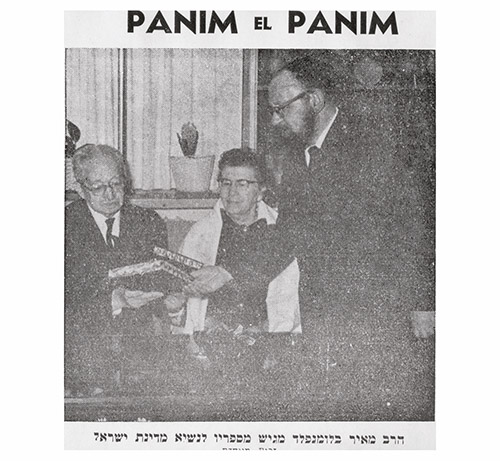



I don’t usually write about people who are directly connected to me; my research is mainly about historical personages and events from the distant past. This time it’s personal as I am paying tribute to the memory of a family member. Rabbi Meir Blumenfeld (1905-1980) was my wife’s (and sons’) great-uncle. Born into a highly respected family of rabbis and community leaders in Kielce, Poland (a town made infamous for conducting a deadly pogrom against Jews after the Holocaust), he quickly became a star pupil of the chasidic Rebbe and Gaon Yitzchak Zelig Morgenstern of the Kotzk-Sokolov dynasty. He was only 18 years old when he received semicha from the distinguished Yeshiva of Warsaw in 1923 and he became a member of the Union of Rabbis of Poland soon after.
He was a mere 20 years old and engaged to be married (his wife Esther nee Schiff came from a distinguished family in her own right; her father, R’ Chaim Yitzchak, was a direct descendant of the 17th-century Frankfurt rabbi and author known as Maharam Schiff) when he authored his first work of Talmudic novellae called “Pri Shlomo.” This work gained him wide acclaim as an ilui (talmudic prodigy).
In 1927 he immigrated to the United States where he was offered the pulpit at Congregation Ahavath Zion, the largest Orthodox Synagogue in Newark, New Jersey. He authored almost two dozen works (some of which are still in manuscript form) on virtually all facets of Torah, among them: Torat Chaim on Shabbat Torah readings; Netivot Nevi’im on haftarot; Shaar Hamelech on Psalms; Perach Shoshana Responsa, Simchat Olam on Festivals; Or Chodosh, Or Olam, Or Torah, Minchat Meir on Halacha; Mishnat Yisrael on Pirkei Avot and more. He was held in high regard both by American Jewry and European Jewry. He also enjoyed a good relationship with both secular and religious leaders as well as with Sephardic rabbis; many of his books received the haskama (approbations) of the Sephardic Chief Rabbis Isaac Uziel, Yitzchak Nissim as well as Ashkenazi Chief Rabbi Issac Herzog along with the Tchebiner Rav, Rabbi Yechiel Weinberg, and many others. In 1960 he visited Israel and met with President Yitzchak Ben Zvi who recognized him for his great scholarship and literary output.
He was very active in improving the spiritual and physical condition of the New Jersey Jewry of his day. He worked tirelessly to improve the kashrut standards for meat and other products and to do away with corruption that was rampant in the meat business on the east coast at the time. He sometimes drew the fire of people who were not too keen on his activities but he persevered.
He passed away in 1980 at the age of 74 and was interred on the Mount of Olives in Jerusalem.
His grave on the Mt. of Olives next to that of our grandfather—his brother—Rabbi Yehuda Aryeh.
It is lamentable that while in the not-too-distant past virtually everybody in the Torah world was intimately familiar with him and his works, today this is unfortunately too often no longer the case. We are trying to change that by undertaking efforts to properly preserve and perpetuate his memory. If you have any reminiscences, anecdotes or other materials that you would like to share about him, please email מכון להוצאת כתבי יד של הגר»מ בלומנפלד זצ»ל at yoelswe@gmail.com.
Joel S. Davidi Weisberger is the founder of the Jewish History Channel and an independent researcher. His forthcoming books deal with the history and historiography of the Medieval Karaite movement and the story of the Sephardic Diaspora in Central and Eastern Europe. He resides in Fair Lawn, New Jersey, with his wife Michal and would love to hear from you at yoelswe@gmail.com.












